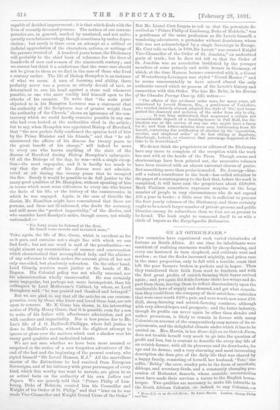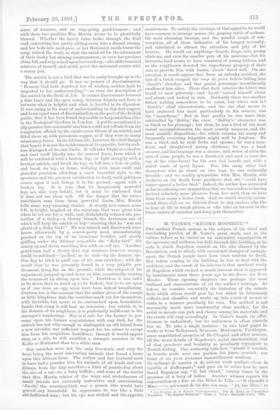ON AN OSTRICH-FARM.*
FEW countries have experienced such varied vicissitudes of fortune as South Africa. At one time its inhabitants were confident of realising enormous wealth by sheep-farming, and every one hastened to turn shepherd, and cultivate wool and mutton ; so that the flocks increased mightily, and prices rose in the same proportion, only to fall with a terrible crash that left the poor farmers broken in pockets and in hopes. Then they transferred their faith from wool to feathers, and with the first great profits of ostrich-farming their hopes revived again ; and yet again did fickle fortune shake her wings and de- part from them, leaving them to reflect disconsolately upon the unalterable laws of supply and demand, and get what consola- tion they could from the company of their ostriches,—ostriches that were once worth £400 a pair, and were worth now some 210. Still, sheep-farming and ostrich-farming continue, although with very altered hopes and prospects; and the latter industry, though its profits can never again be other than slender and rather precarious, is likely to remain in favour with many Colonists on account of the comparatively easy nature of its re- quirements, and the delightful climate under which it has to be carried on. Mrs. Martin, in her lionte-L'efe on an Ostrich-Farm, does not trouble herself very much to go into the question of profit and loss, but is content to describe the every-day life of an ostrich-farmer, with all its pleasures and its drawbacks, its ups and its downs; and a very charming and most interesting description she does give of the daily life that was shared by a happy family, consisting of herself, her husband, Toto ' the collie, 'Bobby' the crow, sundry pets in the form of meerkats, dikkops, and secretary-birds, and a constantly changing pro- cession of Hottentot damsels, whose amiable eccentricities must have made their services a terror to the English house- keeper. Two qualities are necessary to make life tolerable to the South African Colonist, or, indeed, to any Colonist, —a Hmez,f0 on an 0ch4'arm. By Amnia Martin. London ; George Philip and Son.
sense of humour, and an easy-going good-humour ; and with these two qualities Mrs. Martin seems to be plentifully blessed. Whether the heavy rains broke through the frail roof, converting her pretty sitting-room into a dismal swamp, and her beds into mud-pies ; or her Hottentot maids burnt the soup, ruined the wash, or stole the salad-oil for the adornment of their dusky but shining countenances; or even her precious china fell, and ruin seized upon her crockery,—she still remained mistress of herself, and could greet the untoward events with a merry jest.
The ostrich is not a bird that can be easily brought up in the way that it should go. It has no powers of discrimination.
Because God hath deprived her of wisdom, neither bath he Imparted to her understanding,"—as runs the description of the ostrich in the Book of Job. It cannot discriminate between a wire fence and the open camp, between friends and foes, or between what is helpful and what is hurtful to its digestion. It was owing to its want of understanding in this last respect, and to an equal want of discrimination on the part of the British public, that it has been found impossible to keep ostriches alive in the Zoological Gardens in London. A public accustomed to slip pennies into automatic machines could not refrain from the temptation offered by the omnivorous throat of an ostrich, and filled them up with poisonous copper, as if they were so many missionary-boxes. In its African life, however, the chief danger that besets it is not the recklessness of its appetite, but its reek- less disregard of its own limbs. It will take fright at a shadow and hurl itself blindly into the nearest fence, from which it will be extricated with a broken leg ; or fight savagely with a brother-ostrich, and break its leg; or, fall into a hole or gully, and break its leg ; or dance, waltzing with most swift and graceful precision, affording a most beautiful sight to the spectator and the greatest satisfaction to itself, until giddiness comes upon it and brings it to the ground,—again with a broken leg. It is true that its dangerously powerful legs are also very brittle, but it must be confessed that it does not use them well. Of the danger that the owner sometimes runs from those powerful limbs, Mrs. Martin tells some very amusing stories. A sturdy new-comer, some Oft. in height, laughed at the warnings that were given him when he set out for a walk, and disdainfully refused the pro- tection of a tackey—a thorny branch, the dexterous use of which will keep the ostrich at bay—averring that he "was not afraid of a dicky-bird 1" He was missed, and discovered some hours afterwards by a search-party most uncomfortably perched on the top of an ironstone boulder, and slowly grilling under the African sunswhile the " dicky-bird " did sentry up and down, watching him with an evil eye. "Another gentleman had a theory that any creature, however savage, could be subdued—' quelled,' as he said—by the human eye. One day he tried to quell one of his own ostriches ; with the result that he was presently found in a very pitiable pre- dicament, lying flat on the ground; while the subject of his experiment jumped up and down on him, occasionally varying the treatment by sitting upon him." Doubtless it was safer to lie down than to stand up to be kicked; but to be sat upon as if one were an egg mast have been indeed humiliating. Curious, too, is the account that the author gives of the camps Or little kingdoms that the ostriches mark out for themselves, with invisible, but never to be encroached upon, boundaries. Inside that camp it will bear no intrusion; but outside it, in the domain of its neighbour, it is profoundly indifferent to the stranger's wanderings. Nor is it safe for the farmer to pre- sume upon his former acquaintance with any bird, for the ostrich has not wits enough to distinguish an old friend from a new intruder, nor sufficient respect for his owner to except him from his suspicious hostilities ; though it would appear that, as a rule, he will manifest a stronger aversion to the Kaffir or Hottentot than to a white man.
But ostriches were not the only live-stock, and very far from being the most interesting animals that found a home upon this African farm. The author and her husband seem to have had a genuine love for animals of all kinds and 'con- ditions, from the tiny meerkat—a kind of prairie-dog about the size of a rat—to a baby buffalo ; and some of the stories that Mrs. Martin relates of the ways and wickednesses of small friends are extremely instructive and entertaining. Jacob,' the secretary-bird, was a person who would have graced any household. In appearance he was like a little old-fashioned man ; but his eye was wicked and his appetite
omnivorous. To satisfy the cravings of that appetite, he would have recourse to strange noises, the gasping rattle of asthma, the most alarming hiccups, and the painful cough of con- sumption, all of them indicative of his hungry necessity,. and calculated to attract the attention and pity of his hearers. He would cat anything—lizards, frogs, rats, young chickens, and even the smaller pets of his mistress—but his favourite food seems to have consisted of young kittens, and as the neighbours devoted the superfluous progeny of their cats to provide him with feasts, 'Jacob' fared well. On one occasion, it would appear that from an unlucky accident, the last of a batch escaped the coup de grdce before falling into Jacob's' clutches, and that genial personage incontinently swallowed him alive. From that dark interior the kitten was. heard to mew piteously ; and Jacob' turned himself about and about, and looked in vain. Evidently there was another kitten waiting somewhere to be eaten, but where was it ?' 'Jacob's' chief characteristic, and the one that seems to have endeared him most particularly to his owners, was. his "cussedness." But in that quality he was more than outrivalled by 'Bobby,' the crow. 'Bobby's' character was as black as his plumage ; but then, he was a bird of the most varied accomplishments, the most courtly manners, and the most amiable disposition,—for which reasons his many and frequently recurring iniquities might well be forgiven. He' was a thief, and he stole forks and spoons ; he was a mur- derer, and slaughtered young chickens; he was a hard. swearer, and his language was a shame ; and, worst of all in the- eyes of some people, he was a drunkard, and used to turn the tap of the wine-barrel for his own bad benefit, and with a, sinful waste of good liquor. But, like many other bad characters who go about on two legs, be was eminently' loveable ; and we readily sympathise with Mrs. Martin, who- declares, on his death from paralysis, that she "could have better spared a better bird." Indeed, the author has succeeded so far in enlisting our sympathies, that we too confess to having derived infinitely more pleasure from her work than we have done from many a bettor book. And we would warmly recom- mend Home-Life on an Ostrich-Farm to any readers who like to hear of life in rough places, or who take an interest in the lower orders of creation and keep pets themselves.







































 Previous page
Previous page